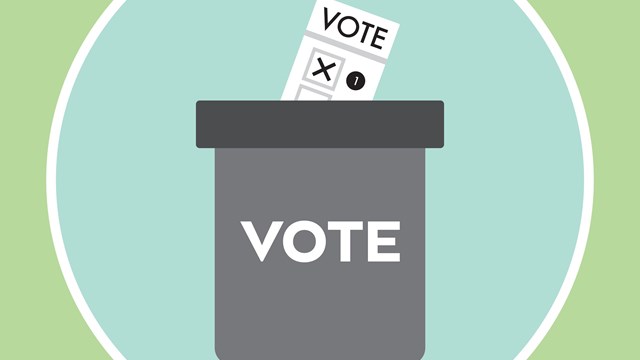
Living in a co-op or condo might not seem like an exercise in democracy, but when election time rolls around for your building's board, being a shareholder/owner means being a voter as well. One person's vote might very well mean the difference in whether or not a policy is enacted.
For uninvolved residents, filling out that proxy ballot and mailing it back prior to the vote might seem like a pain, but for those who are interested in the results of an election, their neighbors' disinterest could present them with an opportunity to influence the vote.
Many people have the bulk of their assets tied up in their condo or co-op, and a change for the worse in the community's rules, practices or standards could adversely affect the value of their home. Or the potential change might just seem life shattering, but unless you are the person who finds the fault, you might not understand the perspective. So it is a good thing that elections allow residents of a community to register their views in an official, binding manner.
Election Process Requirements
Every co-op or condo building must appoint a board to work with the building's manager to ensure that the community's finances, physical maintenance and daily operations are attended to. Usually, a condo has a board of managers and a co-op has a board of directors. While sometimes a board is simply a group of willing volunteers, the members of a co-op or condo community usually choose boards of directors via formal election. Co-op shareholders generally have a full number share vote count, whereas condo unit owners vote a percentage. If the election is run properly, it can be a shining example of how a small democracy works—but if it isn't managed properly, the process could become the subject of a lawsuit filed by disgruntled shareholders.
The bylaws of a building usually stipulate that board elections be held annually. "New York state law says that if the annual meeting/election hasn't happened in the past 13 months and the board hasn't scheduled a meeting, 10 percent of the shareholders can petition to force the election to be held within 60 to 90 days after," says Robert Tierman, a partner with Litwin & Tierman, a Manhattan-based law firm representing boards and buildings. "The bylaws usually even say which months the elections should be held."
According to Tierman, the pre-voting process is pretty much the same in co-ops and condos. The proxy procedure requires notice of the meeting/election to be mailed to all owners 10 to 60 days prior to the meeting. The process begins when the property manager sends residents a notice of the meeting. The owners then send their signed proxy ballot (usually included in the mailing) back to the property manager.
Sending back the signed ballot allows the manager to obtain a quorum for the meeting—an important first step in the voting process. An election can't be held in most places if a quorum is not reached. A quorum is usually obtained when 50 percent or more of the voters have sent in their signed proxies. The signed proxy can also allow the voter to skip the meeting by registering their vote by proxy, but signing and sending it doesn't mean that the proxy will necessarily count as the vote. Even after sending in the signed form, an owner can still cast a vote at the ballot box instead of doing so by mail, if they so choose.
Every Vote Counts
How each resident's vote is counted depends upon what type of community the person lives in. The weight of a condo owner's vote usually depends upon the percentage of the common interest that he owns. Co-op residents have two types of voting: cumulative voting and straight voting. In straight voting, a voter votes all of his or her shares with each vote cast. In cumulative voting, you take the number of seats up for election multiplied by the number of shares you own.
"In cumulative voting, you can pile 1,000 votes on one person," Tierman explains. "It's meant to allow minority shareholders to get some say on the board."
It may seem unfair or bothersome to some owners that a single voter can have such an impact through cumulative voting, but the process is meant to be fair to all of the residents. To the extent that the process is carried out correctly, cumulative voting does allow even the little guy a say in how affairs in the community are managed.
Co-op and condo elections really do show small democracies at work, Tierman says. "In co-ops, it's an amazing thing - people show up for the annual meeting, they scrutinize the decisions of the board, and they participate in elections," he said. "Their involvement is really an amazing thing."
Influencing a Vote
An owner's ability to affect the outcome of an election depends partly upon the bylaws of the community. The type of voting that the building uses determines the weight of each person's vote, but the weight of that vote also can depend upon the actions of the voter.
Before an election, proxy ballots are mailed in prior to the meeting to the managing agent of the building. The votes are recorded on computer, and a voter can come to the meeting later to actually cast his vote, or allow the proxy ballot to count as his vote. A voter can influence the outcome of an election by collecting signed proxy ballots from a number of people in the community and filling them in to vote for the collecting voter's candidate or candidates. This works well for groups of people who agree on an election issue or candidate, but most of the voters don't want to attend the meeting, and a person with a greater interest in the outcome takes their ballots, fills them out accordingly, and casts them at the ballot box.
Sometimes an election can have a deep effect on members of a community, because of the importance of a person's home to his present and future, says Kelly Brier, executive director of New Hyde Park-based Independent Tabulators. "An election really can hit people financially and emotionally," Brier said.
Sometimes the emotional burden of a community-related issue can lead residents to demand immediate change. Residents who are not on the board can call for a special election if they're not happy with the way the current board is running the building. Usually the bylaws of a co-op state that if 20 or 25 residents call for a special meeting, it has to be scheduled, says Tierman.
If the current board refuses to hold special elections despite the residents' desire to have new elections, the only option of the contesting residents is to sue, Tierman says.
"You have to go to court and compel the election," Tierman adds, noting that one must sue within four months of the contested election. "Usually if a board gets a proper demand, they will not ignore the shareholder's request."
Counting the Ballots
In many buildings, the managing agent runs the election and counts the ballots, while in other communities a tabulation company runs the election. Residents can ask for more oversight in the election process, if they see the need.
"If somebody asks for it, then the board is supposed to appoint inspectors of election," Tierman says. "The inspectors open the ballots and give the information to a representative of the managing agent, who enters the information into a computer."
Even such a seemingly transparent process, some shareholders might want to have an outside party come in and manage the election process. In a hotly contested election, a tabulation firm may be hired to make sure the process is beyond reproach.
While an election-coordinating firm can help in an election, using such a firm doesn't necessarily mean that there's a problem with the process. But in the case of a disputed vote tally or when shareholders demand a recount, such a firm can be helpful in resolving the issue. Independent Tabulators counts ballots for about 40 elections each year in New York and New Jersey, and most of the elections are counted as a matter of course—not because there's any suspicion of wrongdoing.
"We don't tabulate on-site," Brier explains. "We have no vested interest in what happens in the building. That's why they hire us—we're independent."
The election itself is held as close to the community as possible, in a nearby synagogue, church, school, or boardroom. The particulars of an election often are specific to each building. But to ensure that the votes are legally cast, an election run by a tabulation company will have its representative ask each voter to show identification prior to voting.
"You have to be an owner to vote, or hold a proxy for an owner," says Ann Miller, president of Smithtown-based Adkinson-Thorne Enterprises, a minute-taking company that also manages elections. "Everything is a secret ballot. Then the election company—my company—counts the votes. Within 72 hours we have the results."
To contest the vote and view the secret ballots, shareholders need approval of the board, or the approval of New York state court.
In many buildings, the managing agent runs the election and counts the ballots, while in other communities a tabulation company runs the election. Residents can ask for more oversight in the election process if they see the need.
"If somebody asks for it, then the board is supposed to appoint inspectors of election," Tierman said. "The inspectors open the ballots and give the information to a representative of the managing agent, who enters the information into a computer."
A hotly-contested election is bound to end with some sore losers, but that doesn't mean that there was anything awry in the voting process, Miller said. "It's very difficult to make everybody happy," she said.
Jonathan Barnes is a freelance writer living in Pittsburgh and a frequent contributor to The Cooperator.






7 Comments
Leave a Comment